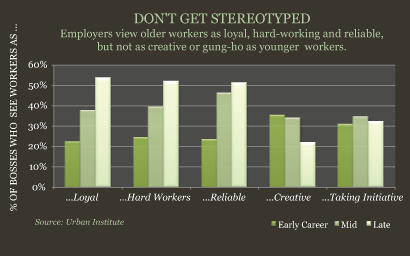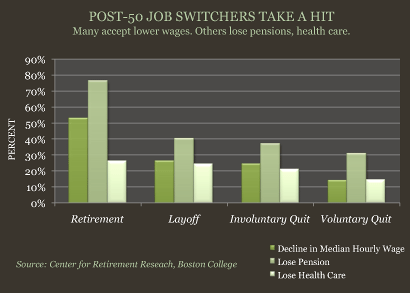Lay the Groundwork Now
Staying employable at 60 means starting to plan in
your 40s.
This is not some obscure future concern you can afford to file
away and think about when you near your 60s. Deborah Russell, director of
workplace issues for AARP, suggests some healthy paranoia could work to your
advantage. “Imagine your boss walks in today and says
you’re no longer needed.” If that sets off panic, you’re
clearly not prepared. “Reality is that we are all expendable at any
time. That’s just a fact. So the question is: do you have a Plan B
ready?” says Russell. That comes down to constantly assessing the job
market in your field, and making sure that if you landed on the job market
tomorrow, your skills and training would be exactly in sync with what
recruiters and hiring managers are looking for.
It’s also a time to shift some of your career energy
from building a reputation to marketing that reputation. “In your 20s
and 30s your head is down and you are working like crazy to prove yourself and
build your expertise, but it’s important to start taking the time in
your 40s to build relationships outside your office, too,” says John
Challenger, chief executive officer of Challenger, Gray & Christmas, an
executive outplacement firm. “Those relationships are what you will
tap in your 50s and 60s. You can’t wait until then to start building
them.”
What Not to Do
Get Pigeonholed
Expertise is great, but not when it lands you in a
professional pigeonhole. The biggest risk is developing a highly specialized
skill or role at one employer that is not necessarily valued — or needed — by other
employers. Sound ominously familiar? Push to get in on other projects or
transferred to other divisions so that you can broaden your experience. If you
do some job hopping in your 30s and 40s
— and who doesn’t?
— make it a priority to take your expertise into new
industries. Just because you are in marketing for health care today
doesn’t mean your next job needs to be in health care; venture out
into marketing in another field. That not only broadens your experience, but
when you find yourself job hunting in your 50s and 60s, you’ve got a
great selling point: experience at transferring skills to new industries.
Work Out to Work Longer
Reduce the risk you won’t be able to stay on
the job.
About 20 percent of people in their late 50s and 60s have a
health issue or disability that makes it impossible for them to continue
working. While there’s no warding off many diseases, there is plenty
in your control. Hit the gym, curb your McDonald’s enthusiasm, and
kick that nicotine habit once and for all, and you are giving yourself far
better odds you will be hale, hearty, and employable in your 60s.
There’s also the potential benefit that a well-tended-to you will
keep your retirement health care costs in check. “Take good care of
yourself and you will be a lot happier when you are 75, and you could cost
yourself a lot less,” says Wharton professor Olivia Mitchell, director
of the Boettner Center for Pensions and Retirement.
Nitty Gritty
What Medicare Won’t Cover
Think again if you expect Medicare to cover all your
retirement health care costs. The Employee Benefit Research Institute (EBRI)
estimates that a 65-year-old couple retiring in 2018 will need about a half
million dollars to cover Medigap, Medicare Part B and Part D premiums, and
other out-of-pocket costs for the duration of their lives. And that presumes
their prescription drug costs fall at the national median. If that couple falls
into the top 10 percent for prescription drug costs, their total out-of-pocket
tab increases to more than $1 million.
Stay Engaged
Keep your head in the game.
Recognize that when you slide into your 50s you are in a
treacherous employment zone. The finish line is coming into view and, though
you’re not entirely checked out, you may not be as hungry to make
your mark as you were at 25. That’s got to change.
To stay employed in your 50s — and, just as important,
in your 60s — requires staying engaged.
href="http://moneywatch.bnet.com/retirement-planning/article/alicia-munnell-on-older-workers/277179">Alicia Munnell, director of
the Center for Retirement Research at Boston College, suggests you spell out
your goals with your boss. “You need to get in there and make it
clear that you want to keep working for another 10 years or however long, and
you want to be considered for every long-term project. And then you need to
sell yourself.”
That means you are front and center volunteering for
strategic planning committees or projects. No coasting allowed; you are all
about pushing yourself, your division, and your company forward with proactive
ideas and initiatives, just like you did 25 years ago. “When you are
older you need to fight through the inherent stereotypes that older workers are
less creative and innovative,” says Sanjiv Kumar, managing director
of the Human Resource Management practice at Buck Consultants.
It’s not just perceptions; it’s often
blatant age bias. One study of on-the-job training found that workers over the
age of 55 were far less likely to receive on-the-job training than younger
workers. Of course, you want to make a stink if that’s happening to
you, but you can’t use it as an excuse either. “Whether
your current employer subsidizes it or not, it’s incumbent on you to
get the training to stay relevant,” says AARP’s Russell.
“Of course, it’s also the responsibility of the employer to
provide the training, but you can’t give up if it’s not
offered. The only way to stay employable is to have relevant skills.”
You also need to start connecting with the younger folks in the
office, and in your field. “If you expect to be working at 65,
everyone you work for is going to be younger than you,” says
Challenger. “You better have relationships with them, and know how to
communicate and relate to them. That doesn’t happen overnight.”
Know Your Market Rate
What you made in your last job doesn’t
matter.
If you find yourself back in job-hunting mode in your 50s or
60s, you need to get your head around what your market value is out on the
street. Quite often when you’ve been at one company for a long time,
you can end up with an inflated salary due to company-specific expertise or
knowledge. You just might find that 100 percent of that value is not
transferable to your next job (see Hot Tip, below).
That’s not all bad news. Munnell says that surveys of
post-50 job switchers show they often are content making less when it also
means having a less stressful job. The trick is to have your finances in solid
enough shape when you make the downshift to a less demanding job that it
doesn’t throw off your retirement plan.
Hot Tip
Prep to Make Less
Post-50 job switchers tend to rake in less money, not more
(see chart below). That makes it risky to assume you can delay stuffing your
retirement accounts for later on; just when you expect to play catch-up, you
could find yourself switching to a lower-paying job. It is also a screaming
argument for not refinancing into a new 30-year mortgage or leveraging up with
a home equity line of credit —
assuming you have any equity —
as you head into your 50s. Saddling yourself with those big-ticket
expenses ratchets up the pressure to keep your earnings high.

